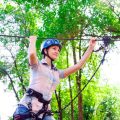Stepping Into the Wilderness: The Trail as a Path to Recovery
For many American veterans, returning home after service can bring invisible battles. The transition from military life to civilian life isn’t always smooth. Memories, anxiety, and a sense of isolation can linger long after the uniform is folded away. But across the United States, veterans are finding new ways to heal—by lacing up their boots and hitting the trail.
The Power of Nature for Veterans
Hiking and backpacking offer more than just exercise or scenic views. For veterans living with PTSD or struggling to adjust to everyday life, nature provides a safe space to process emotions, build confidence, and rediscover purpose. Trails like the Appalachian Trail, Pacific Crest Trail, and countless local routes have become sanctuaries where healing takes root step by step.
Why Hiking Helps
| Benefit | Description |
|---|---|
| Mental Clarity | Time in nature helps quiet the mind and reduce stress or intrusive thoughts. |
| Physical Well-being | Walking and carrying a pack builds strength and releases endorphins. |
| Sense of Accomplishment | Completing trails, even short ones, boosts self-esteem and motivation. |
| Community Connection | Meeting other hikers—especially fellow vets—creates bonds and support systems. |
The Journey Begins: Stories from the Trail
Many veterans describe that first step onto the trail as both nerve-wracking and freeing. Out on the path, there are no ranks or uniforms—just individuals facing challenges together. With every mile, worries fade into the rhythm of footfalls and fresh air. Some join veteran-specific hiking groups; others set out solo but soon find camaraderie among strangers who become friends under the open sky.
A New Mission in Life
The wilderness becomes more than a backdrop—it’s a partner in recovery. Whether it’s sharing stories around a campfire or quietly soaking in mountain views at sunrise, veterans discover that each journey offers small victories. These moments help rebuild trust in themselves and others, forging a new mission: to heal, grow, and find brotherhood beyond footsteps.
2. Finding Brotherhood Beyond the Battlefield
For many veterans, life after service can feel isolating. The tight-knit bonds formed in the military are hard to replicate in civilian life. But out on the trail, something familiar happens—veterans find themselves connecting in deep, meaningful ways. Hiking together through forests or climbing mountain trails brings back that sense of unity and trust.
The Unique Camaraderie of the Trail
When veterans head outdoors, they aren’t just looking for exercise; they’re searching for connection. On the trail, everyone faces the same challenges: steep climbs, unpredictable weather, and long miles. Overcoming these obstacles together sparks a kind of brotherhood that feels a lot like being part of a unit again.
Unit Bonds vs. Trail Bonds
| Military Unit Bonds | Trail Brotherhood |
|---|---|
| Shared mission and purpose | Shared goal of reaching the summit or completing a hike |
| Trust built through tough situations | Trust built through overcoming nature’s challenges together |
| Camaraderie from living and working side by side | Camaraderie from camping, navigating, and supporting each other outdoors |
| Lifelong friendships forged under pressure | Friendships created while pushing physical and mental limits in the wild |
Stories from the Trail
Veterans often say that hiking with fellow vets feels like “coming home.” There’s an unspoken understanding—they know what it means to rely on someone else when things get tough. Whether it’s sharing stories around a campfire or helping each other across a river, these moments create powerful connections that last long after the hike is over.
![]()
3. Stories from the Trail: Personal Journeys of Healing
Walking Their Own Path: Veterans’ Testimonies
For many American veterans, life after service can feel like stepping into unknown territory. The mountains and forests offer a different kind of challenge—one that helps many find peace and a sense of belonging again. Here are some real stories from veterans who have found healing, resilience, and brotherhood on the trail.
Mark’s Journey: Finding Solace in the Smokies
After two tours overseas, Mark struggled with anxiety and sleepless nights. A friend invited him to hike a section of the Appalachian Trail in the Smoky Mountains. Mark recalls, “The rhythm of my boots on dirt was like therapy. Out there, I could breathe deep and let go.” Mark now leads group hikes for other veterans, helping them discover the power of nature to heal.
Samantha’s Story: Rebuilding Confidence Step by Step
Samantha served as a medic in the Army. Transitioning home, she felt disconnected from civilian life. Hiking local trails in Colorado became her outlet. She shares, “Every mile I walked, I left behind a little bit of my pain. Meeting other vets on the trail reminded me I wasn’t alone.” Samantha has since organized veteran hiking meetups that foster community and support.
Carlos’s Experience: Brotherhood Beyond Uniforms
Carlos found it hard to talk about his experiences in Iraq until he joined a veteran hiking group in California. “On the trail, no one judges you,” he says. “We share our stories or just walk in silence together—and that’s enough.” The sense of camaraderie Carlos felt on long hikes gave him purpose and lifelong friends.
How Hiking Has Helped American Veterans Heal
| Veteran | Main Challenge | How Hiking Helped | Current Role |
|---|---|---|---|
| Mark | Anxiety & Sleeplessness | Found peace and routine through nature; now leads group hikes | Hiking Group Leader |
| Samantha | Disconnection from Civilian Life | Regained confidence and built community with other vets | Meetup Organizer |
| Carlos | Difficulty Sharing Experiences | Experienced brotherhood and emotional support on group hikes | Active Group Member |
The Power of Shared Steps
Each veteran’s story is unique, but a common thread runs through them all: the trail offers more than just exercise—it’s a place to rediscover oneself and connect with others who truly understand. Whether it’s through silent walks or open conversations around a campfire, these journeys show how hiking continues to help American veterans move beyond their footsteps toward healing and lasting friendship.
4. Community Organizations: Bridging Gaps with Boots
For many veterans, finding a sense of belonging after military service is a real challenge. Thankfully, across the United States, several organizations are dedicated to helping veterans reconnect—both with nature and each other—through group hikes, wilderness therapy, and outdoor adventures. These groups understand that healing goes beyond just talking; sometimes, it happens best on a trail, surrounded by others who truly get it.
Key U.S. Veteran Outdoor Organizations
Below is a table highlighting some of the most impactful veteran-focused outdoor organizations. Each one brings something unique to the table, but all share the same mission: supporting veterans through community and the great outdoors.
| Organization Name | Main Activities | Who They Serve | Website |
|---|---|---|---|
| The Mission Continues | Community service projects, group hikes, leadership programs | Veterans of all branches looking for purpose post-service | missioncontinues.org |
| Team Red, White & Blue (Team RWB) | Weekly hikes, fitness events, social gatherings | All veterans and their families nationwide | teamrwb.org |
| Sierra Club Military Outdoors | Wilderness therapy trips, backpacking, advocacy training | Veterans interested in conservation and outdoor healing | sierraclub.org/military-outdoors |
| Outward Bound for Veterans | Wilderness expeditions, skill-building courses | Post-9/11 veterans seeking camaraderie and adventure | outwardbound.org/veteran-adventures/ |
| Warrior Expeditions | Long-distance hiking, biking, paddling journeys with gear support and mentorship | Combat veterans looking for extended outdoor experiences | warriorexpeditions.org |
How These Groups Make a Difference
These organizations go far beyond just organizing hikes. They create safe spaces where veterans can open up about their experiences without judgment. Whether its a day hike in a national park or a weeks-long trek on the Appalachian Trail, these shared adventures foster real friendships and provide powerful moments of reflection and growth.
The Power of Shared Experiences
No one understands a veteran like another veteran. On the trail, conversations flow easily—sometimes about life in uniform, sometimes about adjusting to civilian life, and sometimes about nothing at all except the beauty of the wild. This shared understanding builds trust and lasting bonds.
Your First Step: Getting Connected Locally
If youre a veteran searching for connection or know someone who is, reaching out to one of these groups can be life-changing. Most have chapters or events in cities across America. Check their websites for local hikes or volunteer opportunities—your next adventure (and new friends) could be closer than you think!
5. A Trail Forward: Reclaiming Identity and Inspiring Others
For many veterans, stepping onto a hiking trail is more than just an outdoor adventure—its a path to rediscovering who they are outside of military life. The journey on the trail allows veterans to reclaim their sense of self, develop confidence, and realize that healing is possible. These experiences go far beyond the individual, creating a ripple effect that impacts families, friends, and communities.
Personal Empowerment Through Hiking
On the trail, every step brings new challenges and rewards. Veterans learn to trust themselves again as they navigate tough terrain and unpredictable weather. The sense of accomplishment from reaching a summit or completing a long hike helps rebuild self-esteem. Hiking also encourages mindfulness, letting veterans focus on the present moment instead of past struggles.
| Benefits for Veterans | How It Helps |
|---|---|
| Self-confidence | Achieving hiking goals boosts personal belief |
| Mental clarity | Nature provides space for reflection and growth |
| Stress reduction | Physical activity releases endorphins and relieves anxiety |
| Purpose & direction | Setting new goals helps replace lost structure from military life |
Breaking Down Stigmas About Mental Health
When veterans openly share their hiking stories, it challenges stereotypes about mental health. By talking about struggles with PTSD or depression in the context of healing through nature, they encourage others to seek help and let them know theyre not alone. This openness breaks down barriers and shows that vulnerability can be a strength.
Ways Veterans Are Changing the Conversation:
- Sharing experiences in support groups or on social media
- Leading group hikes for others facing similar challenges
- Participating in veteran-focused outdoor organizations like Warrior Expeditions or Team Red, White & Blue
Inspiring Communities Beyond the Trail
The impact doesnt stop with individual veterans. Their journeys inspire families to spend time outdoors together, encourage neighbors to explore local trails, and show younger generations the power of resilience. Local businesses, parks departments, and nonprofit organizations often join in by supporting veteran hiking initiatives or hosting community events.
Community Inspiration at a Glance:
- Parks offering free entry days for veterans and families
- Youth mentorship programs connecting veterans and teens on hikes
- Towns organizing annual “Veterans on the Trail” awareness walks
- Schools inviting veterans to speak about overcoming adversity through nature
The journey from military service to civilian life is never easy, but for many veterans, the trail offers hope—a way forward filled with purpose, connection, and inspiration for everyone around them.


